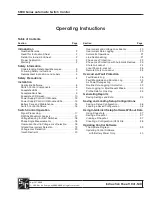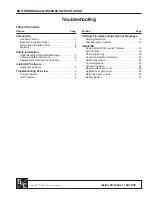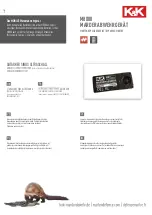
172-65260m-05 (S-COS/S-COSR Pressure Reducing Valve) 27 Oct 2008
7
4. Precautions for the Installation of Additional Fittings Before or After the Reducing
Valve
In order to ensure stable steam flow, the piping upstream and downstream of the
reducing valve must be straight runs. If a pressure reducing valve is installed
either directly before or after an elbow or control valve, unevenness in steam
flow may result in chattering and unstable pressure.
To ensure stable steam flow, it is recommended that the pressure reducing valve
be installed on straight runs of piping, as illustrated below.
①
Inlet (primary side) of the pressure reducing valve
NOTE: d = pipe diameter
Maintain a straight piping
run of
10 d or more
when a
manual valve, a strainer or
an elbow, etc. is installed.
(Example: if nominal size is 25
mm, have 250 mm or more)
Maintain a straight piping
run of
30 d or more
when
an automated valve (on-off
valve) is installed.
(Example: if nominal size is 25
mm, have 750 mm or more)
②
Outlet (secondary side) of the pressure reducing valve
Maintain a straight piping
run of
15 d or more
when
a manual valve, a strainer
or an elbow, etc. is
installed.
(Example: if nominal size is 25
mm, have 375 mm or more)
Maintain a straight piping
run of
30 d or more
when a
safety valve is installed.
(Example: if nominal size is 25
mm, have 750 mm or more)
Maintain a straight piping
run of
30 d or more
when
another pressure reducing
valve is installed.
(Two-stage
pressure reduction)
(Example: if nominal size is 25
mm, have 750 mm or more)
Maintain a straight piping
run of
30 d or more
when a
control valve or an
automated valve (on-off
valve) is installed.
(Example: if nominal size is 25
mm, have 750 mm or more)
Valve, strainer,
elbow, etc.
PRV
10 d or
more
Valve, strainer,
elbow, etc.
Less
than
10 d
Automatic
Valve
30 d or more
Automatic
Valve
Less than
30 d
15 d or more
30 d or more
Safety
Valve
Safety
Valve
30 d or more
Second
PRV
Control or
Automated Valve
30 d or more
Less than
15 d
Less than
30 d
Less than
30 d
Less than
30 d
Second
PRV
Control or
Automated Valve
PRV
PRV
PRV
PRV
PRV
PRV
PRV
PRV
PRV
PRV
PRV








































